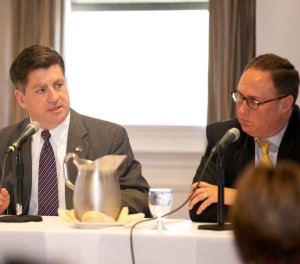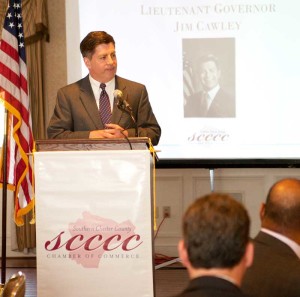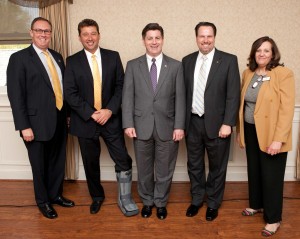Lt. Gov., chair of Public Utilities Commission talk economic development benefits of Marcellus Shale

Lt. Gov. Jim Cawley (left) and Chair of the Pennsylvania Public Utility Commission and questions following remarks at Wednesday’s Southern Chester County Chamber of Commerce Annual Spring Luncheon. Photo credit: Amy Tucker Photography.
By Mike McGann, Editor, The Times
NEW GARDEN — Offering a strong defense of Gov. Tom Corbett’s economic policies, specifically those related to spending cuts and natural gas extraction, Lt. Gov. Jim Cawley and Robert Powelson, Chair of the state Public Utility Commission detailed the coming positive impact of those policies for local businesses in Chester County in front of an audience of just under 200 at Wednesday’s Southern Chester County Chamber of Commerce Annual Spring Luncheon at Hartefeld National Golf Club.
Cawley cited the Corbett Administration’s ability to overcome a $4.2 billion budget deficit without raising taxes as the first of many achievements, although not universally popular, managed to put the state on a more solid economic footing, despite a slow national economy.
“When Tom and I first came to Harrisburg, we had a pretty simple mission in mind,” Cawley said. “it was actually a three-pronged mission. First, we were going to reform the way state government was doing its business. We felt that things had gotten off track in Harrisburg and we wanted to do something about that.”
Second he said, was a need to bring state spending in line with revenue or “restore fiscal discipline.”
“We were going to stop spending our children’s children’s children’s money,” he said.

Lt. Gov. Jim Cawley spoke at length about the reforms brought by Gov. Tom Corbett in terms of spending and touted infrastructure investments proposed by the governor. Photo credit: Amy Tucker Photography
The third piece, Cawley, said was better partnering with the business community with one aim: “to help put Pennsylvanians back to work.”
Among other priorities — and one with a potentially giant economic impact for southeast Pennsylvania — were saving the three Delaware-County petrochemical refineries. While in the short term, keeping those facilities open saved hundred of jobs, Cawley said, future use for refining and distribution of natural gas could have an enormous economic impact on the region. Later during the luncheon, Powelson went into much greater detail on how those refineries will be key to local economic growth tied to the Marcellus Shale gas field.
Cawley, a former Bucks County Commissioner, also defended the need to invest in infrastructure — citing the age of bridges in the state the average age of a bridge in the state is 51 years old — and the economic impact of better roads. Corbett has proposed investing $1.8 billion on the state’s highways and bridges, which would be paid for through higher wholesale gas taxes.
Corbett and administration officials have argued since making the proposal earlier this year that the infrastructure improvements would better allow the state to compete in the region, spurring economic activity and job growth.
But Cawley, speaking Wednesday, said that if you don’t buy the economic development impact of infrastructure upgrades, virtually everyone should be swayed by the value of improving safety.

Sharing a moment, following Wednesday’s luncheon: from left: Robert F. Powelson, Chairman, Pennsylvania Public Utility Commission; Anthony Poluch, The Bryn Mawr Trust Company-Presenting Sponsor; Lieutenant Governor Jim Cawley; Matthew Tucker, 2013 SCCCC President; Cheryl Kuhn, SCCCC Executive Director. Photo credit: Amy Tucker Photography
“Every school day in the this state, 1.5 million children, including my son Nick, use those roads and those bridges to get back and forth to school,” he said. “As a father, as a Pennsylvanian, I believe that we owe it to them to make sure that those roads and bridges are safe.”
Cawley then went on to address a subject that appeared to have virtually total support in the room: privatizing the state liquor stores.
“It is time for us to recognize that vestiges of the past, are just that,” Cawley said, noting that just two states totally control liquor: Utah and Pennsylvania.
“The Quakers and the Mormons,” he joked.
Cawley said that for the last 10 years expenses have been higher than profits for the state system. He said that many state residents shop out of state for better selection and pricing — potentially costing the state millions in tax revenue and a sign that the state stores aren’t meeting consumer needs.
“It is very telling that Pennsylvanians are already making the decision,” Cawley said. “We should be responsive as a state government.”
Powelson, who lives in Kennett Square and is a former President of the Chester County Chamber of Business & Industry, focused his remarks on the controversial Marcellus Shale natural gas extraction — both in terms of the process and its environmental impact, as well as whether a severance tax should have been levied on drillers.
He said that current safeguards in place for drilling are the national standard, and neighboring states such as New York are looking closely at them for possible adoption.
He noted that an existing pipeline will be able to move gas products to refineries in Delaware County, which could likely spark economic development across the region — and turn the state into “the Saudi Arabia of natural gas.” He said the thought that there would likely be a multi $ billion investment in the Delaware County area in facilities to turn the gas into other products, something would have a big economic impact on the whole region.
“Somebody over the next three to four to five years is going to make an investment in one of those refinery complexes,” he said. “I know Sen. (Dominic) Pileggi and I get a little giddy about it, but we might get our own $4 billion investment in this part of the state. And I guarantee you, and there are many small business owners here, it will impact you in a very good way.”
He said he thought that gas exports were likely — and because the dredging of the Delaware River, the port of Philadelphia and Delaware County refineries — as well as a potential petrochemical processing plant — could have a massive economic impact on the region, an impact that would ripple strongly into Chester County.
“No disrespect to my friends in Wilmington, Del., but those (gas) tankers are coming to Philadelphia,” he said.
Powelson also explained why he thought impact fees, rather than a severance tax, was a better choice for Pennsylvania.
“With an impact fee, we’ve collected in two cycles, over $400 million,” he said. “Chester County, through its conservation district, received money. The City of Philadelphia received $1.2 million for greenways.”
And while there are existing pipelines, Powelson said, he expects the need for more — and a number of them could run through Chester County, as it represents a direct route to Delaware County and the ports.
“Pipelines are going to be a big issue here in Chester County — I’m not going to sit here and sugarcoat it,” he said. “For full disclosure, don’t blame me. I don’t site pipelines, it’s the Federal Energy Regulatory Commission. But you can’t have the benefits of what we’re talking about without pipeline logistics.”
But environmental concerns will not be sacrificed just for economic growth, he said.
“I will hold these people’s feet to the fire,” he said. “It has to be done with respect to the environment. They have to be transparent. They can’t just run to the Federal Energy Regulatory Commission and say ‘we don’t need to listen to you.’ they need to listen. Because what comes out of these public input sessions are good ideas around siting this pipeline.”
From pipeline siting to drilling, he made it clear that the state would not trade clean water or threatening the essential nature of the county for economic development.
“We will not waiver in our commitment to safety and doing this right,” Powelson said.
Questions for both speakers included topics regarding taxation, environmental safety of natural gas extraction, gambling as a source of revenue, the benefits of the Marcellus Shale with regard to Amtrak and other forms of transportation, and how the Chamber businesses may benefit from natural gas extraction.
Both Cawley and Powelson took questions from the audience following their remarks, most related to Marcellus Shale.
Matthew D. Tucker, 2013 President of the Southern Chester County Chamber of Commerce, who revisited the challenge he posed to all members of the Chamber in his acceptance speech at the Annual Dinner earlier this year: “become more involved with the chamber through events and volunteer work.“I want to applaud you for embracing this challenge,” said Tucker.
Tucker delivered a special thanks to Presenting Sponsor, The Bryn Mawr Trust Company, and Reception Sponsor, MidCoast Community Bank. He thanked Community Leader Sponsors Constellation, Fulton Bank, Jennersville Regional Hospital, Longwood Gardens, Pegasus Technologies, Riley Riper Hollin & Colagreco Attorneys at Law and The Tri-M Group, as well as Partner Sponsors, Susquehanna Bank and WSFS Bank – and Supporting Sponsors ButlerBank Consulting, Dansko, Inc., DesignDesign and Kennett Systems.






